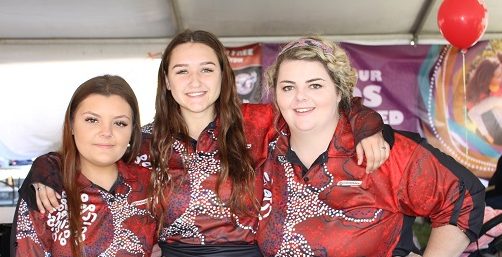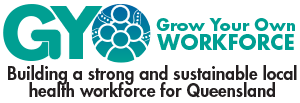UnitingCare
Queensland
- Outside-in
- Health and Community Services Sector
- South East Queensland and Regional Queensland

The Challenge
UnitingCare Queensland is a health and community services provider, and one of the largest charities in Australia. Through their services they are committed to empowering older people, those living with a disability, people requiring health care in hospital or at home, Aboriginal and Torres Strait Islanders, children and families.
UnitingCare Queensland identified a need to grow and retain a workforce to better reflect their Aboriginal and Torres Strait Islander clients, service delivery, and business needs. They sought to develop new strategies to attract Aboriginal and Torres Strait Islander job seekers into the organisation, while providing ongoing career development opportunities for existing workers.
The Solution
- To invest in and develop targeted education and employment opportunities, and career progression pathways programs, for Aboriginal and Torres Strait Islander community members.
- To create a traineeship program that offered Certificate III level pathways in administration, health, community services, warehousing, hospitality, and personal care.
- To offer 60 identified positions over a 3-year period, with an aim to support business needs, lead to real job outcomes, and to support the continuation of traineeship programs after this period.
Implementation
Through partnerships with the Department of Aboriginal and Torres Strait Islander Partnerships (DATSIP), Yourtown, and employment service providers, UnitingCare Queensland has implemented a traineeship program to provide opportunities for individuals, both full-time and school-based, to gain ‘hands on’ paid workplace experience whilst completing their relevant Vocational Education and Training (VET) qualification. UnitingCare Queensland provides opportunities across multiple work areas and work streams, in clinical and non-clinical roles.
Organisational strategies
- UnitingCare Queensland funds the program.
- Traineeships are offered and hosted across multiple work areas and streams within the organisation.
- Results are monitored and evaluated to assess the outcomes of the different pathways offered across the organisation.
- Cultural appreciation training is provided to each work area and service hosting a trainee, to ensure there is a shared understanding of optimal ways to make the workplaces more culturally appropriate and safe.
- Full-time trainees are expected to be transitioned into ongoing roles within the host work area or service upon completion of the program.
- Government-funded apprenticeship and trainee incentives, and Job Service Provider wage subsidies, have been utilised to fund a diploma in leadership and management program to upskill existing Aboriginal and Torres Strait Islander employees, in preparation for current and future management positions.
Partnership strategies
- Partnerships were established with DATSIP in regions throughout Queensland to provide additional wraparound supports, to further assist the trainees in achieving their goals and to provide ongoing advice and support to UnitingCare Queensland.
- Yourtown was engaged to provide mentoring support through the Vocational Training & Employment Centre (VTEC) and Youth Engagement Program (YEP).
- Matchworks and Indigenous Workstars were engaged to assist in identifying job seekers and supporting the recruitment process for each traineeship intake.
Program design strategies
- The traineeship program is coordinated from a central location and has a dedicated training coordinator.
- Each trainee is allocated a workplace supervisor, cultural mentor, a trainer and assessor who visits the workplace to deliver training.
- Training coordinators visit the trainees at least once a month and are responsible for checking training plan progress, mentoring, and workplace support.
- Training coordinators assist trainees and their workplace supervisors to navigate any issues as they arise. They may also work with local agencies and partners if additional support is required to ensure that trainees are on track for successful program completion.
- A career progression session is completed 6 weeks to 3 months prior to traineeship completion. Trainees are supported by a specialist recruitment advisor to identify and apply for internal and external job opportunities that would provide ongoing employment.
Results
- 14 out of 18 trainees from the first cohort successfully graduated with a full qualification (77.7% completion rate). UnitingCare Queensland is currently transitioning some of the full-time trainees into ongoing roles within the organisation.
- 10 full-time and 4 school-based trainees have been recruited for the first intake of the 2019 cohort.
Lessons Learned
- Early engagement with school students, such as during Year 10, with a pathway program that includes work experience and Certificate II and III level qualifications enables UnitingCare Queensland to engage with young people early in their career journey.
- Early engagement with school students allows the organisation more time to allocate and plan resources to support individuals’ career aspirations and tailor a pathway for them, including university options.
- Traineeship programs need to be evaluated regularly to ensure the pathway and qualification level is relevant to the organisation’s business needs, and engages the individual at the appropriate stage in their own education and career journey.
- Some school leavers may be ineligible for a traineeship program as they have already completed a Certificate III qualification while at school. In response to this, UnitingCare Queensland is exploring cadetship models using diploma-level qualifications.
REQUIREMENTS FOR
REPLICATION
Do you…
- have capacity to provide mentoring and other wraparound supports to trainees? If not, can your organisation form partnerships with agencies and organisations that provide these services?
- provide cultural training to staff to ensure workplaces and environments are culturally safe and appropriate prior to trainees commencing?
Can you…
- commit resources and time to develop a career pathway plan tailored to the individual’s needs and interest areas?
- provide meaningful training pathways that will lead to job outcomes for program participants?
CONSIDERATIONS FOR PROGRAM SCALING
Do you…
- have the capacity to use technology (e.g. online platforms) to provide additional supports, such as mentoring, when face-to-face communication options are not available or viable?
- have a dedicated program coordinator/manager?
POTENTIAL RISKS
What if…
- the program design is too rigid to adapt to individual needs and situations?
- the program design does not allow for variations in delivery methods across community and regional needs?
- the costs of remote training delivery are high? This needs to be considered in the project planning and budget.
- remote locations have limited internet connection? Alternative training delivery approaches need to be designed to suit different locations and student needs.
